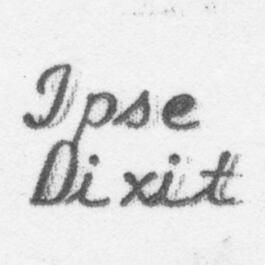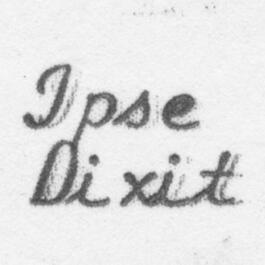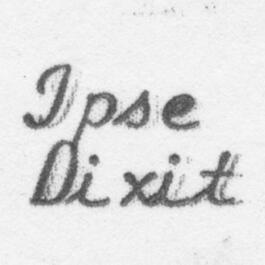
Ipse Dixit
Ipse Dixit is a podcast on legal scholarship. Each episode of Ipse Dixit features a different guest discussing their scholarship. The podcast also features several special series."From the Archives" consists historical recordings potentially of interest to legal scholars and lawyers."The Homicide Squad" consists of investigations of the true stories behind different murder ballads, as well as examples of how different musicians have interpreted the song over time."The Day Antitrust Died?" is co-hosted with Ramsi Woodcock, Assistant Professor of Law at the University of Kentucky College of Law, and consists of oral histories of the 1974 Airlie House Conference on antitrust law, a pivotal moment in the history of antitrust theory and policy. The hosts of Ipse Dixit are:Brian L. Frye, Spears-Gilbert Associate Professor of Law at the University of Kentucky College of LawLuce Nguyen, a student at Oberlin College and the co-founder of the Oberlin Policy Research Institute, an undergraduate public policy organization based at Oberlin CollegeMaybell Romero, Assistant Professor of Law at Northern Illinois University College of LawAntonia Eliason, Assistant Professor of Law at the University of Mississippi School of LawSaurabh Vishnubhakat, Associate Professor of Law at Texas A&M School of LawJohn Culhane, Professor of Law at Widener University Delaware Law SchoolBenjamin Edwards, Associate Professor of Law at the UNLV William S. Boyd School of LawMatthew Bruckner, Associate Professor of Law at Howard University School of Law Comments and suggestions are always welcome at brianlfrye@gmail.com. You can follow the Ipse Dixit on Twitter at @IpseDixitPod. Hosted on Acast. See acast.com/privacy for more information.
Show episodes
In this episode, Valentin Jeutner, Associate Professor of Law at Lund University and Retained Lecturer in Law at Pembroke College, Oxford University, discusses his book "[l]ex machina: unlikely encounters of international law and technology," which is published by Lund University. Jeutner begins by introducing listener
In this episode, Sharon Yadin, Senior Lecturer of Law and Regulation at the Yezreel Valley College School of Public Administration and Public Policy, discusses her draft article "The Hidden Nature of Regulation," which will be published in the Harvard Negotiation Law Review. Yadin begins by describing the conventional
In this episode, Jorge L. Contreras, Distinguished University Professor, James T. Jensen Endowed Professor for Transactional Law, and Director of the Program on Intellectual Property and Technology Law at the University of Utah S.J. Quinney College of Law, discusses his draft article "Silly Patents." Contreras begins b
In this episode, Nikola Datzov, Associate Professor of Law at the University of North Dakota School of Law, discusses his article "AI Jurisprudence: Toward Automated Justice," which will be published in the Northwestern Journal of Technology and Intellectual Property. Datzov begins by briefly explaining how AI models w
In this episode, Mark Edward Blankenship, Jr., Assistant Professor of Law at St. Thomas University College of Law, discusses his article "Reconsidering the 'Aesthetic Nondiscrimination' Doctrine in American Copyright Law," which is published in the Berkeley Journal of Entertainment and Sports Law. Blankenship begins by
In this episode, John Tehranian, Paul W. Wildman Chair and Professor of Law at Southwestern Law School and a founding partner of One LLP, discusses his new book, "The Secret Life of Copyright: Intellectual Property and Inequality in the Age of AI," which is published by Cambridge University Press. Tehranian begins by d


